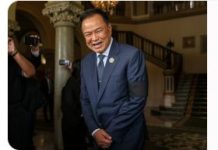BUENOS AIRES, OCT 27 – President Javier Milei’s party, La Libertad Avanza, achieved a commanding victory in Argentina’s midterm elections, giving the libertarian leader a renewed mandate to push ahead with his radical economic overhaul amid widespread discontent over deep spending cuts.
The results mark a major relief for Milei, whose popularity had dipped in recent weeks as austerity measures tightened household budgets. Analysts said the outcome signaled that many Argentines, wary of past economic crises, preferred to stay the course rather than risk renewed instability.
“Argentines showed that they don’t want to return to the model of failure,” Milei declared to a cheering crowd in Buenos Aires, celebrating what he called a “triumph beyond question.”
Public endurance despite austerity
Gustavo Cordoba, director of the Zuban Cordoba polling firm, said the vote reflected the public’s willingness to give the Milei administration more time. “Many people were willing to give the government another chance,” he said. “The triumph is unobjectionable, unquestionable.”
With this result, Milei’s government appears to have secured roughly one-third of the seats in the Chamber of Deputies — enough to prevent Congress from overturning future presidential vetoes. The opposition had earlier challenged several vetoes on spending bills Milei argued would endanger fiscal balance.
Marcelo Garcia, Americas director at Horizon Engage, said Milei’s stronger-than-expected showing gives him “the political capital needed to defend his decrees and vetoes” and strengthens his position among allies.
Foreign investors, too, have been buoyed by Argentina’s progress in reining in inflation — which has fallen from 12.8% before Milei took office to 2.1% last month — and achieving a fiscal surplus through deregulation and subsidy cuts.
Trump administration’s support
Milei’s relationship with Washington has also played a role in stabilizing Argentina’s economy. The Trump administration extended a financial lifeline worth up to $40 billion, including a $20 billion currency swap already finalized and a proposed $20 billion debt investment facility.
While the White House has not commented on the election results, observers noted that Washington is likely pleased with Milei’s reform momentum and Argentina’s fiscal discipline.
In Buenos Aires province — long a Peronist stronghold — La Libertad Avanza secured 41.5% of the vote against 40.8% for the Peronist coalition, marking a dramatic political shift. Nationwide, the party’s representation in the House of Deputies grew to 64 seats from 37.
Overall, 127 seats in the lower house and 24 in the Senate were contested in the midterms. The Peronist movement remains the largest minority in both chambers but faces a resurgent Milei bloc.
Political scientist Maria Laura Tagina said low voter turnout, about 68%, may have favored Milei, as disillusioned voters frustrated with austerity stayed home.

















